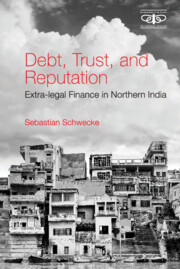
-
Select format
-
- Publisher:
- Cambridge University Press
- Publication date:
- November 2021
- June 2022
- ISBN:
- 9781009043670
- 9781316517260
- Dimensions:
- (229 x 152 mm)
- Weight & Pages:
- 0.64kg, 384 Pages
- Dimensions:
- Weight & Pages:
- Subjects:
- History, Political Economy, Political Sociology, Politics and International Relations, Economic History
You may already have access via personal or institutional login- Subjects:
- History, Political Economy, Political Sociology, Politics and International Relations, Economic History
Book description
Starting in the late nineteenth century, colonial rule in India took an active interest in regulating financial markets beyond the bridgeheads of European capital in intercontinental trade. Regulatory efforts were part of a modernizing project seeking to produce alignments between British and Indian business procedures, and to create the financial basis for incipient industrialization in India. For vast sections of Indian society, however, they pushed credit/debt relations into the realm of extra-legality, while the new, regulated agents of finance remained incapable (and unwilling) of serving their needs. Combining historical and ethnographic approaches, the book questions underlying assumptions of modernization in finance that continue to prevail in postcolonial India, and delineates the socioeconomic responses they produced, and studies the reputational economies of debt that have emerged instead – extra-legal markets embedded into communication flows on trust and reputation that have turned out to be significantly more exploitative than their colonial predecessors.
Contents
Metrics
Altmetric attention score
Full text views
Full text views help Loading metrics...
Loading metrics...
* Views captured on Cambridge Core between #date#. This data will be updated every 24 hours.
Usage data cannot currently be displayed.
Accessibility standard: Unknown
Why this information is here
This section outlines the accessibility features of this content - including support for screen readers, full keyboard navigation and high-contrast display options. This may not be relevant for you.
Accessibility Information
Accessibility compliance for the PDF of this book is currently unknown and may be updated in the future.


